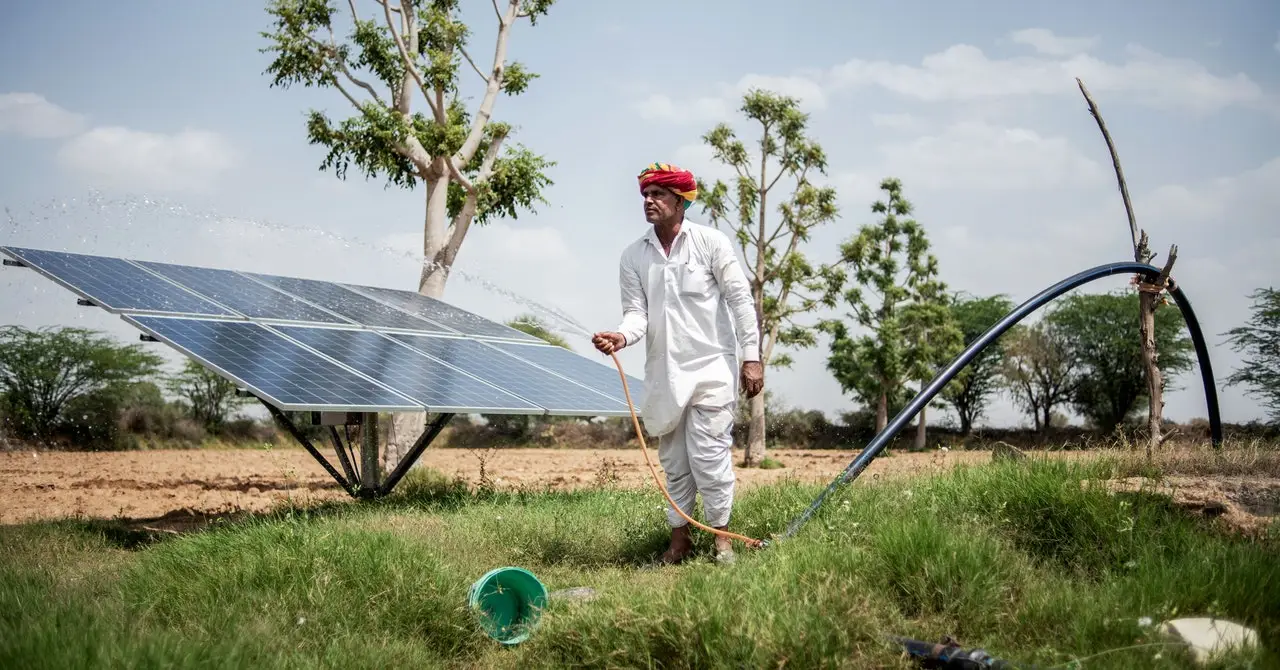Solar pumps are spreading rapidly among rural communities in many water-starved regions across India, Africa, and elsewhere. These devices can tap underground water all day long at no charge, without government scrutiny.
For now, they can be great news for farmers, with the potential to transform agriculture and improve food security. The pumps can supply water throughout the daylight hours, extending their croplands into deserts, ending their reliance on unpredictable rains, and sometimes replacing existing costly-to-operate diesel or grid-powered pumps.
But this solar-powered hydrological revolution is emptying already-stressed underground water reserves—also known as groundwaters or aquifers. The very success of solar pumps is “threatening the viability of many aquifers already at risk of running dry,” Soumya Balasubramanya, an economist at the World Bank with extensive experience of water policy, warned in January.
An innovation that initially looked capable of reducing fossil-fuel consumption while also helping farmers prosper is rapidly turning into an environmental time bomb.
Maybe it’s me but the tone of the article reads to me like “the issue is solar pumps, they’re depleting groundwater reserves” whereas the point seems to be more that pumping groundwater is ungoverned and access to it is now easier than ever, thanks to solar powered pumps.
Unfortunately, doesn’t change that the issue exists.
I don’t think it’s just you. It does seem a bit pessimistic / fatalistic at first glance, especially the headline, but it’s clearly a more complicated issue once you read through. You’re right, the issue isn’t solar energy but more about being careful about how it’s put to use and the impact thereof. If anything it shows the dangers of expecting capitalism to save us and issues we run into if we try to take the easy way out. We know the issue exists now so it’s more a question of what next.
It is really your classic tragedy of the commons issue that capitalism has always been bad at solving.
There is no question what to do next, build solar desalination and pump it to where it’s needed using solar pumps.
The problem is not complicated. The problem is population. The solution is complicated.
Our local aquifer didn’t need the introduction of solar pumps. They manage with fuel powered pumps and corn, all along the stream. In August the water is gone.
The farms without accessible water just drill a deep well, 120m or thereabouts, and now you have magical water - and the problem gets worse!
The solar just makes it more accessible, so even the remotest areas can participate in the destruction.
At same time there is only very little collection of rainwater from any roof and/or water storage for use in the dry season, and not much education about drought resistant plants. I think that’s where efforts need to point towards: share knowledge of different people all over the world as to how to farm with less water and how to farm in respect of the existing aquifer.
share knowledge of different people all over the world
I feel despite the internet we are pretty bad at that in general in all kinds of professions and other parts of life that could benefit from it.
It’s getting better. We have become pretty good at sharing cat pictures. I guess it’s just time to direct our focus more efficiently. This instance is just one of many tiny efforts in that direction.
And this is why the idiotic Mr Beast well project is so stupid. Building wells willy nilly is extremly short sighted and might ruin aquifers permanently in the long term.
Looks like we need wind traps or water collectors that they have on dune or tatooine or realistically change the farming practices to use less water.
I know that GMO gets a bad name, but taking indigenous food plants and modifying them to be even more suited to the area could add yet more benefits.
Having the seed lines owned by the public would be the only way to make it viable for developing countries tries, though.
That doesn’t really work in reality in arid regions because there isn’t much water in the air and you would need a lot of energy to pull huge amounts of air through your device to even theoretically get significant amounts of water.
I guess only 1 sun is not enough energy right now. Would be neat though.
The places which actually have water problems have all built big desalination projects which are working incredibly well, they’re solar powered too which is nice. Isreal has even been refilling the Sea of Galilee (which is a freshwater lake btw)
The US could do similar and so could everywhere else, the reality is current use isn’t really a huge problem - no one is going without and it’s not really damaging anything. The cost of infrastructure is falling rapidly and improving dramatically so we’re going to see these systems built but transition from fossil fuels is more important though they do go hand in hand as modern designs are engineered to work with excess load
The principle is simple you have it placed near big solar and wind developments and at peek generation you use that to desalt water and pump it into a lifted tank which gives it the pressure needed to pump it through pipes to an upriver lake for storage and use. This allows the solar to output a steady feed into the main power grid without wasting the over capacity,
I’m excited if I could actually see it happen
There’s just too many people on this planet.
Yea sure that was said years ago then farming happened. Then it was said again and thr new world was found. Then it was said again and the harber process was found.
Yes we will probably make lab grown meat and we can keep increasing our population.
But look we are farming absoulte marginal, temporary farmland.
But there is too many people. We make up a huge amount of the biomass on this planet there are just too many people and we are fucked because of it.
There doesn’t seem to be any solution to it either.
And where populations are shrinking all we hear is breed more to save the economy
Crazy part is I read Africa’s pop is going to double over next 35 years. Is that even sustainable in that region? North America and eruope are already getting tons of migration because of the current condition living there. Maybe they need more birth controls to reduce the resouce needs.
No it’s about bringing in immigrants to keep wages down and house prices up.
For the economy. It’s all for the economy. Profits must grow. House prices can only go up. GDP is the only metric that matters.
I can understand why some people just want to burn it all down.
Please look at past trends in fertility, and predictions of reputable, independent sources. The growth rate is already sinking fast (just in case: the rate is sinking, population is still growing). With the current/recent situation, in the short term the growth continues, but slows and mid-term there will be a reduction in population. And already today we do have the means to support this population much more sustainably, we just choose not to (we even produce food to turn it into gasoline o.O ): It would require a massive wealth/standards re-distribution, and re-distribution is socialist and thus bad (/s in case that’s necessary). A possible starting point: https://ourworldindata.org/population-growth-over-time
About the only solution would be barbarism. A lottery to decide who gets to live and who has to go. And I’m not willing to participate in that. But as things get desperate, there will be those who are.
China’s one child policy worked well for China.
But there is no way to get a whole world, one child policy.
No need to, as countries develop, the birth rate already shrinks.
The problem is that many countries have ageing populations that vote in favour of policies that increase incentives to have more children so there are young people to care for those voting older people in their old age and pay for their pensions.
We’ve got endless solutions already we could use and even more in the pipelines, things like vertical farming is already huge for many crops and only getting more popular as is intermixed land use - as automation continues to boom we’re only going to see more of these especially as construction becomes more automated.
A lot of traditionally space hogging land uses are on their way out, factories are far smaller than they used to be for example with much larger output. This trend is certain to increase as mult-tool automation and task based processing gain ubiquity. That’s a lot of room for vertical farming even before we start using autonomous tools to cheaply convert subterranean spaces - water cycling and environmental control reduce the water use to less than one percent of traditional agriculture while removing the need for pesticides.
Even without that automation will increase yield significantly, very likely also make it easier to the point where we become used to seeing food grown throughout cities and harvested by robots - why waste a south facing wall when you could either grow food on it yourself or rent it to someone for a share of the yield.
There are endless solutions to the fear you mention. Unfortunately, the greed and selfishness of our current system means we’re fighting for scraps rather than moving forward to improve things for all but people have always been awful and we got this far.
This is like saying “we shouldn’t give people food, because then they live longer, and have more time to do crap.” Kind of an unhinged thought, TBH.






